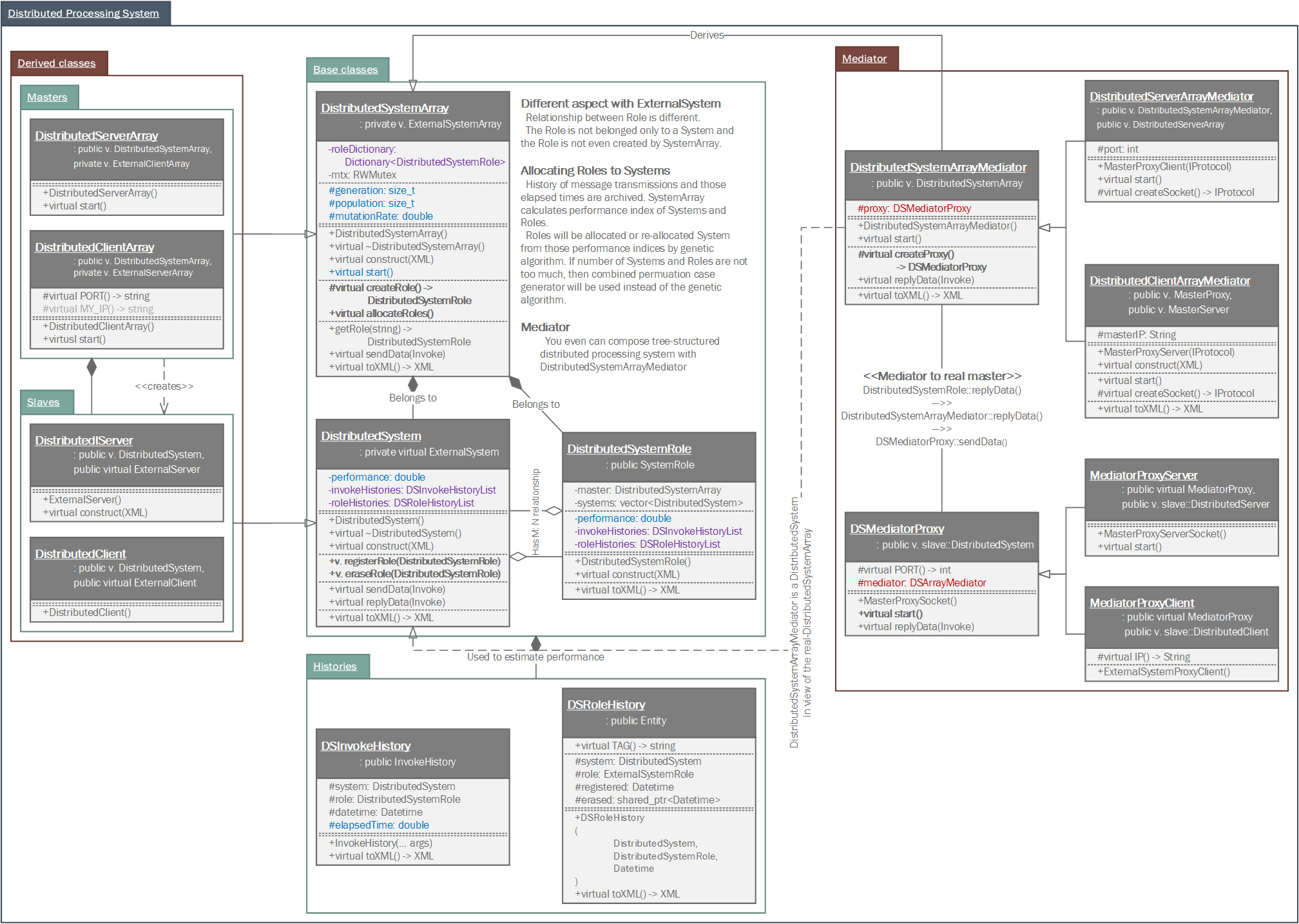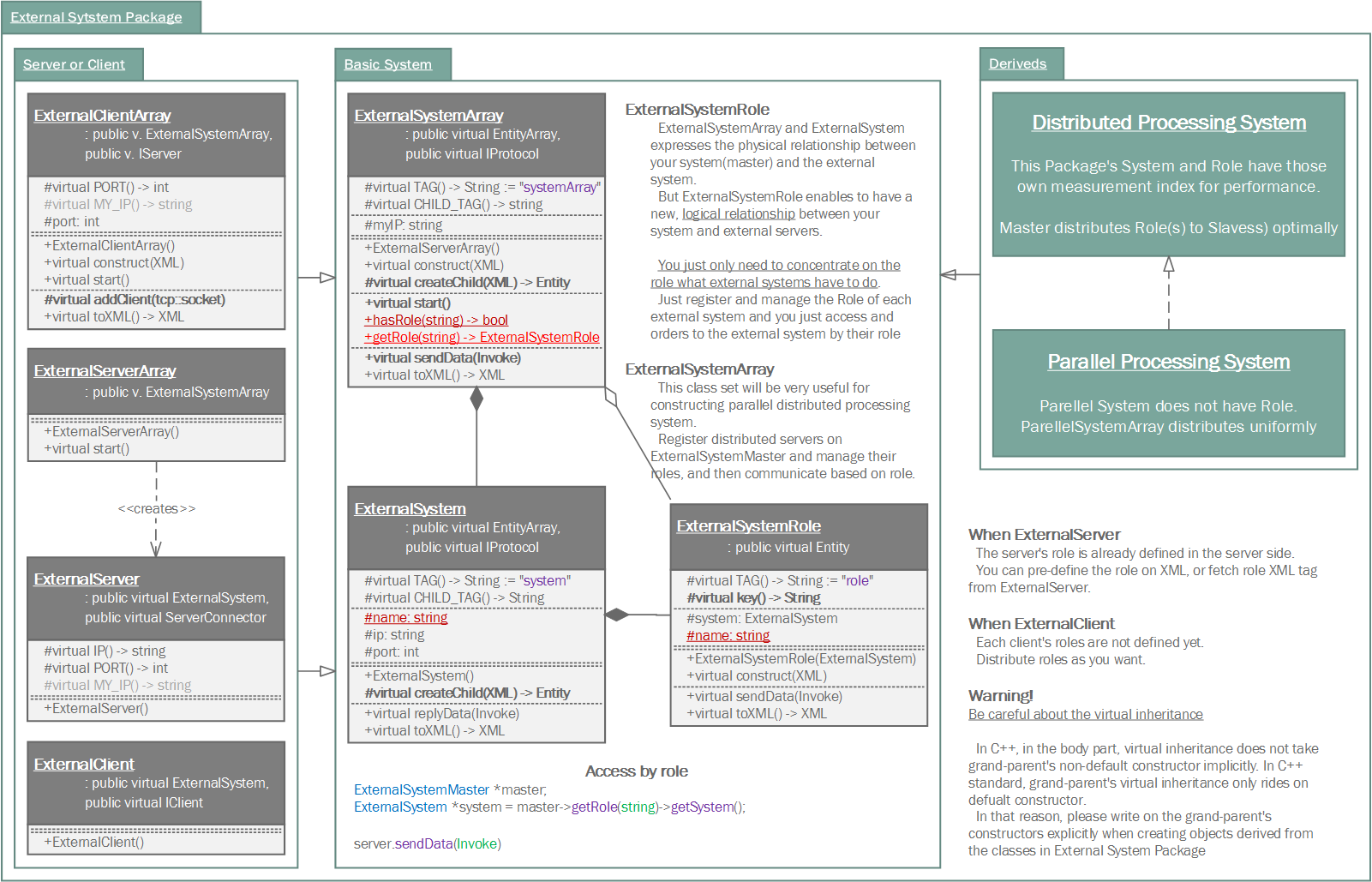|
Samchon Framework for CPP
1.0.0
|
|
Samchon Framework for CPP
1.0.0
|
An array of DistributedServer(s). More...
#include <DistributedServerArray.hpp>

Public Member Functions | |
| DistributedServerArray () | |
| Default Constructor. More... | |
| virtual void | start () override |
| Start interaction. More... | |
 Public Member Functions inherited from samchon::protocol::master::DistributedSystemArray Public Member Functions inherited from samchon::protocol::master::DistributedSystemArray | |
| DistributedSystemArray () | |
| Default Constructor. More... | |
| virtual void | construct (std::shared_ptr< library::XML >) override |
| Construct data of the Entity from an XML object. More... | |
| virtual void | allocateRoles () |
| Allocate roles to each distributed processing system. More... | |
| auto | hasRole (const std::string &) const -> bool |
| Test whether has a role. More... | |
| auto | getRole (const std::string &) const -> std::shared_ptr< DistributedSystemRole > |
| Get a role. More... | |
| virtual auto | toXML () const -> std::shared_ptr< library::XML > override |
| Get an XML object represents the EntityGroup. More... | |
 Public Member Functions inherited from samchon::protocol::ExternalSystemArray Public Member Functions inherited from samchon::protocol::ExternalSystemArray | |
| ExternalSystemArray () | |
| Default Constructor. More... | |
| auto | hasRole (const std::string &) const -> bool |
| Test whether has a role. More... | |
| auto | getRole (const std::string &) const -> std::shared_ptr< ExternalSystemRole > |
| Get a role. More... | |
| virtual void | sendData (std::shared_ptr< Invoke >) override |
| Sends an Invoke message to related ExternalSystem(s). More... | |
| virtual void | replyData (std::shared_ptr< Invoke >) override |
| Handle replied Invoke message. More... | |
| virtual auto | TAG () const -> std::string override |
| A tag name when represented by XML. More... | |
| virtual auto | CHILD_TAG () const -> std::string override |
| A tag name of children. More... | |
 Public Member Functions inherited from samchon::protocol::EntityGroup< _Container, _ETy, T > Public Member Functions inherited from samchon::protocol::EntityGroup< _Container, _ETy, T > | |
| EntityGroup () | |
| Default Constructor. More... | |
| auto | has (const std::string &key) const -> bool |
| Indicates whether a container has an object having the specified identifier. More... | |
| auto | get (const std::string &key) -> value_type & |
| Access the element by specified identifier(key). More... | |
| auto | get (const std::string &key) const -> const value_type & |
| Access the const element by specified identifier(key). More... | |
 Public Member Functions inherited from samchon::protocol::Entity Public Member Functions inherited from samchon::protocol::Entity | |
| Entity () | |
| Default Constructor. More... | |
| virtual auto | key () const -> std::string |
| Get a key that can identify the Entity uniquely. More... | |
 Public Member Functions inherited from samchon::protocol::IEntityGroup Public Member Functions inherited from samchon::protocol::IEntityGroup | |
| IEntityGroup () | |
| Default Constructor. More... | |
 Public Member Functions inherited from samchon::protocol::IProtocol Public Member Functions inherited from samchon::protocol::IProtocol | |
| IProtocol () | |
| Default Constructor. More... | |
Additional Inherited Members | |
 Protected Member Functions inherited from samchon::protocol::master::DistributedSystemArray Protected Member Functions inherited from samchon::protocol::master::DistributedSystemArray | |
| virtual auto | createRole (std::shared_ptr< library::XML >) -> DistributedSystemRole *=0 |
| Factory method of a DistributedSystemRole. More... | |
 Protected Member Functions inherited from samchon::protocol::EntityGroup< _Container, _ETy, T > Protected Member Functions inherited from samchon::protocol::EntityGroup< _Container, _ETy, T > | |
| virtual auto | createChild (std::shared_ptr< library::XML >) -> entity_type *=0 |
| Factory method of a child Entity. More... | |
 Protected Attributes inherited from samchon::protocol::master::DistributedSystemArray Protected Attributes inherited from samchon::protocol::master::DistributedSystemArray | |
| Dictionary< std::shared_ptr< DistributedSystemRole > > | roleDictionary |
| A dictionary of role objects. More... | |
| struct library::GAParameters | gaParameters |
| A structure of parameters for genetic algorithm. More... | |
An array of DistributedServer(s).
DistributedServerArray is an DistributedSystemArray specialized in servers' driver.
DistributedSystemArray class is an ExternalSystemArray and an abstract class containing and managing distributed system drivers within framework of master. The DistributedSystemArray class allocates DistributedSystemRole objects to DistributedSystem objects for optimization.
Unlike the ExternalSystemRole class which is dependent on an ExternalSystem, DistributedSystemRole is not dependent on a DistributedSystem and even can be allocated to multiple DistributedSystem objects. Allocation of DistributedSystemRole(s) to DistributedSystem(s) is determined by estimation of performance index pursuing best distribution. If number of DistributedSystem and DistributedSystemRole objects is not a lot, optimize by combined permuation algorithm. Else the objects are a lot, the allocation will be optimized by genetic algorithm.

ExternalSystemArray is an abstract class containing and managing external system drivers.
Also, ExternalSystemArray can access to ExternalSystemRole(s) directly. With the method, you can use an ExternalSystemRole as "logical proxy" of an ExternalSystem. Of course, the ExternalSystemRole is belonged to an ExternalSystem. However, if you access an ExternalSystemRole from an ExternalSystemArray directly, not passing by a belonged ExternalSystem, and send an Invoke message even you're not knowing which ExternalSystem is related in, the ExternalSystemRole acted a role of proxy.
It's called as "Proxy pattern". With the pattern, you can only concentrate on ExternalSystemRole itself, what to do with Invoke message, irrespective of the ExternalSystemRole is belonged to which ExternalSystem.

Definition at line 22 of file DistributedServerArray.hpp.
| samchon::protocol::master::DistributedServerArray::DistributedServerArray | ( | ) |
Default Constructor.
|
overridevirtual |
Start interaction.
An abstract method starting interaction with external systems.
If external systems are servers, starts connection to them, else clients, opens a server and accepts the external systems. You can addict your own procudures of starting drivers, but if you directly override method of abstract ExternalSystemArray, be careful about virtual inheritance.
Reimplemented from samchon::protocol::ExternalServerArray.
Reimplemented in samchon::protocol::master::DistributedServerArrayMediator.